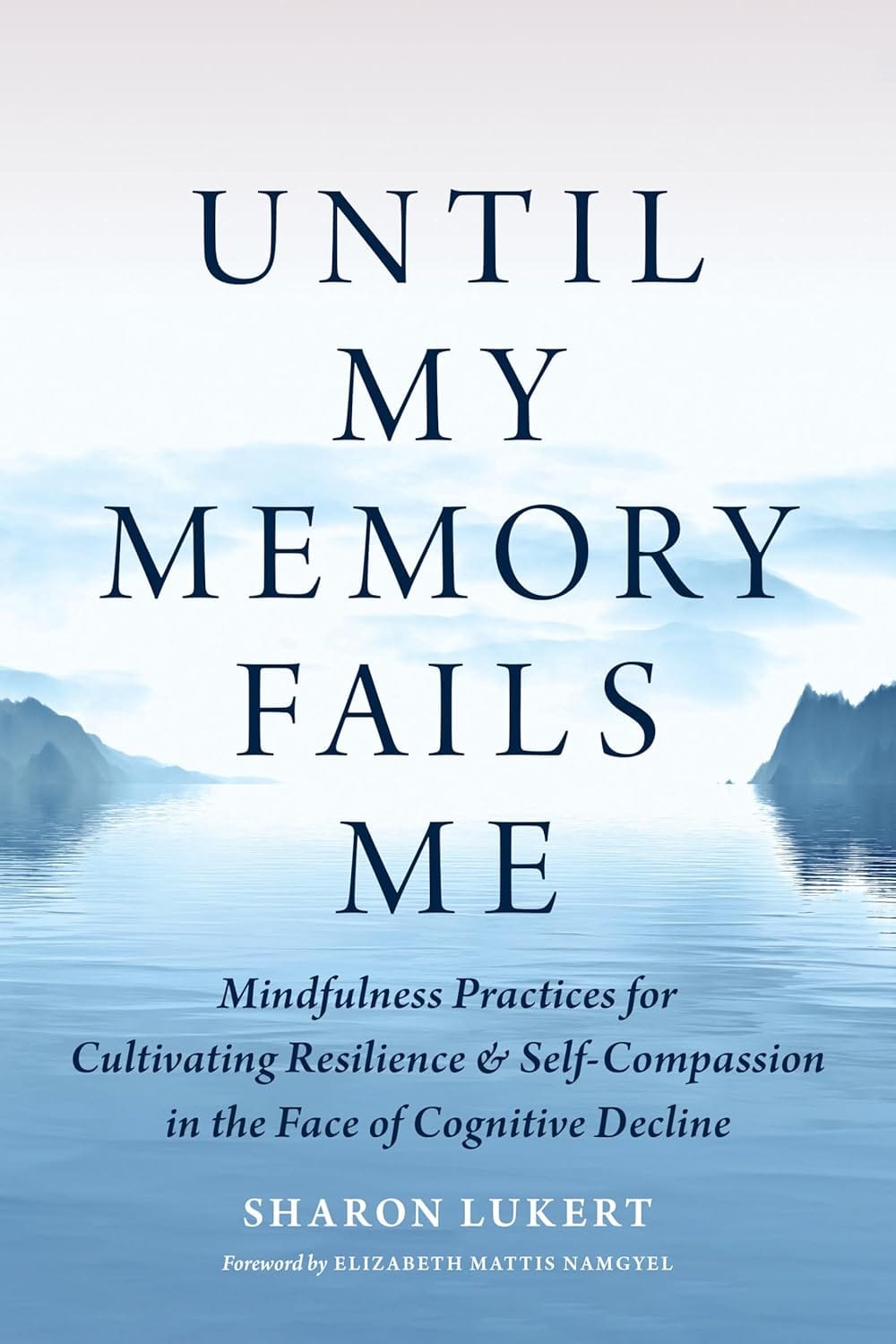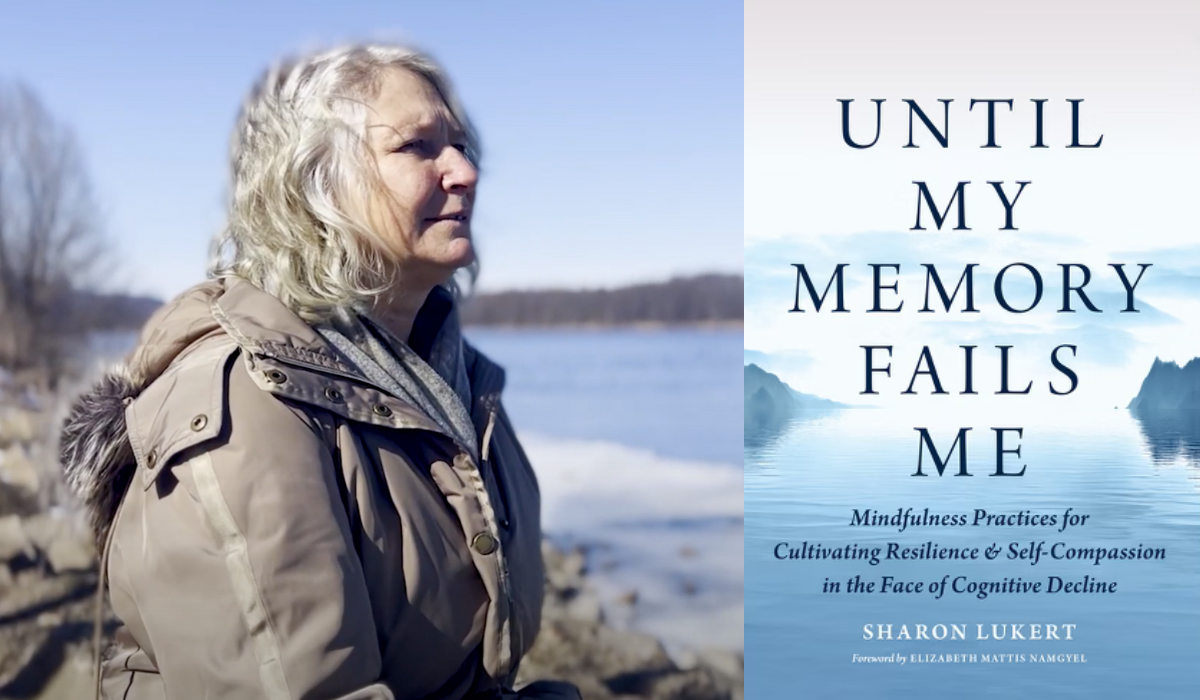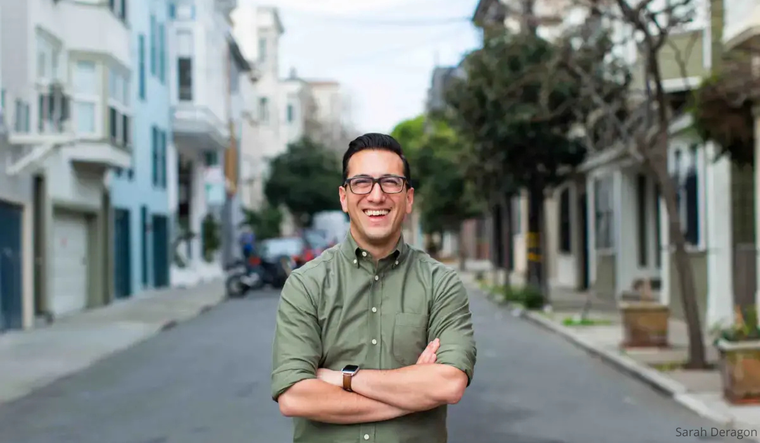Lessons on Finding Meaning and Passion While Living With Cognitive Decline
What do we truly know about cognitive decline and how it unfolds in a life? In her forthcoming book, Until My Memory Fails Me, Sharon Lukert explores this question and shares her tools and wisdom for those impacted.
Lukert admits she didn't know much about the topic, even having worked as a nurse and a home health aid, until she was diagnosed in 2021 with Mild Cognitive Impairment (MCI), a condition described as an early stage of memory loss or other cognitive ability loss. Lukert, who is a retired Buddhist Chaplain, explains to us that any type of diagnosis within the realm of dementia can be devastating and can rob a person of hope. "Some of that comes from the stigma and the misinformation about dementia," she adds. Yet she attests that life can be vibrant, rich, and fulfilling even in the face of a diagnosis, and she shares some of her practices to bring this truth to light.
As you may expect, Lukert's wisdom is emotionally wide-reaching and holds lessons for all of us.
A CONVERSATION WITH SHARON LUKERT
You were diagnosed with Mild Cognitive Impairment in 2021. How did you feel when you received the news?
I have to say, when I first heard it, I was in shock. I didn't expect it. As my husband and I digested the news over the next couple of days, I felt devastated. At first, this was partially because the doctor told me that this kind of diagnosis can lead to Alzheimer's dementia within three to five years. I was 66 then, and that seemed young to me. Of course, my doctor told me it was a small chance and not everyone does, but you know how our human brains work, and I looked at the negative side. [Editor's Note: Estimates vary as to how many people who have MCI will develop dementia.] But he had encouraged me to educate myself and learn more about it, which was the most helpful thing.
[Note: You'll find links to Lukert's top resources at the bottom of this article.]
Why was education so helpful for you?
I think that many people don't understand what dementia is, how it unfolds, and what life can be like with dementia. I was this way until I'd been moved into this world of early diagnosis and early dementia. People tend to think of end stage: someone who can't communicate, can't do anything for themselves anymore, and is at the end of their life. But so much quality of life can happen, which is why education is important. That's a big part of why I wanted to write this book.
What has your diagnosis taught you?
So many of us have our self-worth and identity wrapped up in what we can do, not who we are. This is still something I wrestle with. Every time I can't remember something, lose a word, or am not able to do something I used to be able to do easily, there's a sense of loss. But we are so much more than that. We are more than the things we do, which is an important thing to keep in mind at every point of the way. There is a lot of quality of life.
I used to think that it was a one-dimensional, linear line from normal memory and cognition to end-of-life dementia. But, like anything else in life, it's not linear. It's multi-dimensional. It's up and down. You can remember some things and forget others. It's just not that straightforward. And so much joy, love, and laughter can happen, even in the later stages. My mother has Alzheimer's, and she often can be confused about the time of day or season or where we are. Sometimes, her sentences don't quite make sense. Yet she'll remember my brother-in-law had been out on a trip, and he'll she'll ask about it. So, there are these little pockets that remain intact. You don't become a blank slate.
For someone either experiencing cognitive decline or caring for someone who does, what words of encouragement would you like to offer?
If you're going through cognitive issues or if those around you are, it takes a lot of patience and gentleness. So, I say to practice allowing patience and gentleness and humor for yourself.
Also, so often when you're with someone with dementia, there isn't much you can do for them, but you can be present. That presence makes more of a difference for them than anything you can do. Sometimes, when I go to visit my mother, I get very busy. I find myself straightening out her clothes or making sure she's got the snacks that she likes. But finally, when I sit down and just be with her, I can see her light up. We may not even have anything to talk about, but sitting together is sometimes the most important thing.
What is another mindfulness practice that has helped you through all of this?
One practice that probably everyone can relate to, whether you have cognitive issues or not, is something I learned from one of my main teachers, Pema Chodron when I was living in community with her. You learn when you are living in community or living with anybody, or even being out of the grocery store with other people, that sometimes people can be annoying. So, whenever you find yourself responding or reacting to someone out of irritation or impatience, remind yourself that this person wants to be happy too, just like me. Irritation or impatience can come up a lot with cognitive issues, either as the person with it or someone helping the person with it. When those feelings come up, it can be so helpful to remember: Just like me, this person wants to be happy. Just like me, this person wants to be safe. At first, this can feel kind of stiff. You may wonder, Why am I saying this? But I have found that it can be very helpful.
I mentioned the grocery store because that's one of the places where I use this a lot. I may be trying to get through an aisle, or somebody's hurrying me, and I'll start feeling flustered, irritated, or annoyed at someone else. I remind myself that, just like me, they want to be happy. This also helps because it's a reminder that I don't know what's going on in their lives any more than they know what's happening in mine. It brings up a sense of kindness and openness.
Sharon's Educational Resources
“Their whole page on Mild Cognitive Impairment is where I first found the definition of what it is.”
University resources
“Here in Wisconsin, where I live, there’s an Alzheimer's Disease Research Center at UW Madison, which offers a wonderful educational around early diagnosis and things you can do to help yourself. I know there are many others like these around the country.”
“This podcast is hosted by Dr Nathaniel Chin [the medical director and Clinical Core Co-Leader for the Wisconsin Alzheimer's Disease Research Center]. He interviews different professionals in the field of research around dementia and also people living with dementia.
Additional Recommendation from The Sunday Paper:
WAM is committed to changing the story of women and Alzheimer’s though funding women-based Alzheimer’s research, supporting those impacted by the disease, and educating people about their brain health. WAM at Cleveland Clinic is also the home of the nation’s first and only Alzheimer’s Prevention Center designed just for women.

Sharon Lukert is a retired Buddhist chaplain and the author of the forthcoming book Until My Memory Fails Me, which you can preorder here
Please note that we may receive affiliate commissions from the sales of linked products.



